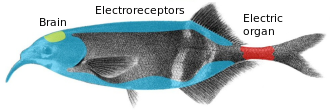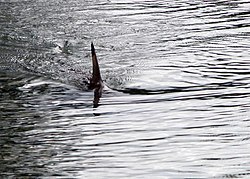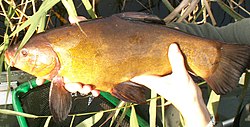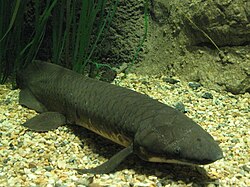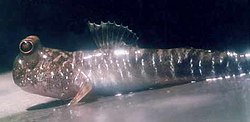Electroreception and electrogenesis are the closely related biological abilities to perceive electrical stimuli and to generate electric fields. Both...
41 KB (3,592 words) - 08:01, 10 April 2025
J. S., and W. G. R. Crampton. 2005. Electroreception and electrogenesis. Pp. 431–472 in The Physiology of Fishes, 3rd Edition. D. H. Evans and J. B. Claiborne...
31 KB (3,205 words) - 17:32, 23 May 2025
Ampullae of Lorenzini (section Electroreception)
physically associated with and evolved from the mechanosensory lateral line organs of early vertebrates. Passive electroreception using ampullae is an ancestral...
20 KB (2,082 words) - 20:26, 30 March 2025
Albert, J.S., and W.G.R. Crampton. 2005. Electroreception and electrogenesis. pp. 431–472 in The Physiology of Fishes, 3rd Edition. D.H. Evans and J.B. Claiborne...
25 KB (2,930 words) - 10:22, 1 April 2025
Electric fish (section Evolution and phylogeny)
S2CID 13359966. Albert, J. S.; Crampton, William G. R. (2006). "Electroreception and electrogenesis". In Evans, David H.; Claiborne, James B. (eds.). The Physiology...
32 KB (2,961 words) - 06:30, 23 May 2025
Fish (section Electrogenesis)
York: Farrar, Straus and Giroux. ISBN 9780374207946. Albert, J. S.; Crampton, W. G. (2006). "Electroreception and Electrogenesis". In Lutz, P. L. (ed...
103 KB (10,247 words) - 20:30, 22 May 2025
accompanied by their possible meanings. Scientific names for individual species and higher taxa are included in parentheses. Contents: Top 0–9 A B C D E F G...
26 KB (1,988 words) - 19:52, 17 May 2025
Shark (redirect from Shark senses and behaviors)
slits on each side, and pectoral fins that are not fused to the head. Modern sharks are classified within the division Selachii and are the sister group...
145 KB (14,427 words) - 21:29, 22 May 2025
Species. Modern study began with Hans Lissmann's 1951 study of electroreception and electrogenesis in Gymnarchus niloticus. Detailed descriptions of the powerful...
25 KB (2,344 words) - 05:55, 19 April 2025
A dorsal fin is a fin on the back of most marine and freshwater vertebrates. Dorsal fins have evolved independently several times through convergent evolution...
8 KB (880 words) - 15:23, 12 January 2025
sea anemones, starfish, snails, bristleworms and sea cucumbers—and benthivore or benthivorous, for fish and invertebrates that feed on material from the...
9 KB (926 words) - 14:37, 7 May 2025
Fish physiology (section Electroreception)
Albert, J.S., and W.G.R. Crampton. 2005. Electroreception and electrogenesis. pp. 431–472 in The Physiology of Fishes, 3rd Edition. D.H. Evans and J.B. Claiborne...
80 KB (9,831 words) - 13:30, 23 May 2025
environments around the world. Fishkeepers often keep tropical fish in freshwater and saltwater aquariums. The term "tropical fish" is not a taxonomic group, but...
5 KB (685 words) - 14:12, 19 May 2025
including fish and cephalopods. The organ can be simple, or as complex as the human eye, equipped with lenses, shutters, color filters, and reflectors; unlike...
4 KB (268 words) - 14:23, 6 April 2025
most often by wave-like lateral flexions of the fish's body and tail in the water, and in various specialised fish by motions of the fins. The major...
49 KB (5,929 words) - 00:34, 21 December 2024
Freshwater fish (section Sources and references)
all of their lives in bodies of fresh water such as rivers, lakes, ponds and inland wetlands, where the salinity is less than 1.05%. These environments...
29 KB (3,280 words) - 17:24, 23 May 2025
African knifefish (section Electroreception)
a sense other than vision. This opened up research into electroreception and electrogenesis in fish. He demonstrated by experiment that it could locate...
24 KB (2,522 words) - 18:07, 23 April 2025
Lungfish (section Anatomy and morphology)
characteristics within the Osteichthyes, including the ability to breathe air, and ancestral structures within Sarcopterygii, including the presence of lobed...
44 KB (3,952 words) - 05:28, 13 May 2025
Juvenile fish Fish go through various life stages between fertilization and adulthood. The life of fish start as spawned eggs which hatch into immotile...
20 KB (2,413 words) - 06:03, 7 April 2025
the single living genus, Amia with two species, the bowfins (Amia calva and Amia ocellicauda), as well as the Ginglymodi, the sole living representatives...
16 KB (1,393 words) - 15:14, 15 February 2025
Fish gill (section Lampreys and hagfish)
that allow fish to breathe underwater. Most fish exchange gases like oxygen and carbon dioxide using gills on both sides of the pharynx (throat). Gills possess...
21 KB (2,525 words) - 07:23, 6 March 2025
from fossil records. They are the earliest known vertebrates, and include the first and extinct fish that lived through the Cambrian to the Quaternary...
2 KB (219 words) - 13:55, 15 January 2025
Milt is the seminal fluid of fish, mollusks, and certain other water-dwelling animals. They reproduce by spraying this fluid which contains the sperm...
5 KB (534 words) - 21:49, 27 April 2025
species" and "spp" means "multiple species". Electric fish Electroreception and electrogenesis Watanabe, Akira; Takeda, Kimihisa (1963). "The change of...
19 KB (1,895 words) - 05:53, 13 June 2023
Bichir (section Diet and traits)
portal Bichirs /ˈbɪʃɪərz/ and the reedfish comprise Polypteridae /pɒlɪpˈtɛrɪdiː/, a family of archaic ray-finned fishes and the only family in the order...
15 KB (1,307 words) - 05:37, 23 May 2025
(using paired fins and tail), and jumping. Many of these methods of locomotion incorporate multiple combinations of pectoral-, pelvic-, and tail-fin movement...
10 KB (1,150 words) - 19:01, 8 April 2025
cover. Such gills are characteristic of cartilaginous fish such as sharks and rays, as well as deep-branching vertebrates such as lampreys. In contrast...
3 KB (403 words) - 00:57, 21 December 2024
freshwater organisms are stenohaline, and will die in seawater, and similarly most marine organisms are stenohaline, and cannot live in fresh water. Osmoregulation...
9 KB (917 words) - 19:17, 4 January 2024
Batomorphi (redirect from Rays and skates)
Holmes; Hopkins, Carl D.; Popper, Arthur N.; Fay, Richard R. (2005). Electroreception. Springer. pp. 5–7. ISBN 978-0-387-23192-1. Faria, Vicente V.; McDavitt...
29 KB (2,435 words) - 14:16, 23 May 2025
bony fish and chimaeras that serves as a facial support structure and a protective covering for the gills; it is also used for respiration and feeding....
5 KB (596 words) - 21:22, 31 May 2024

